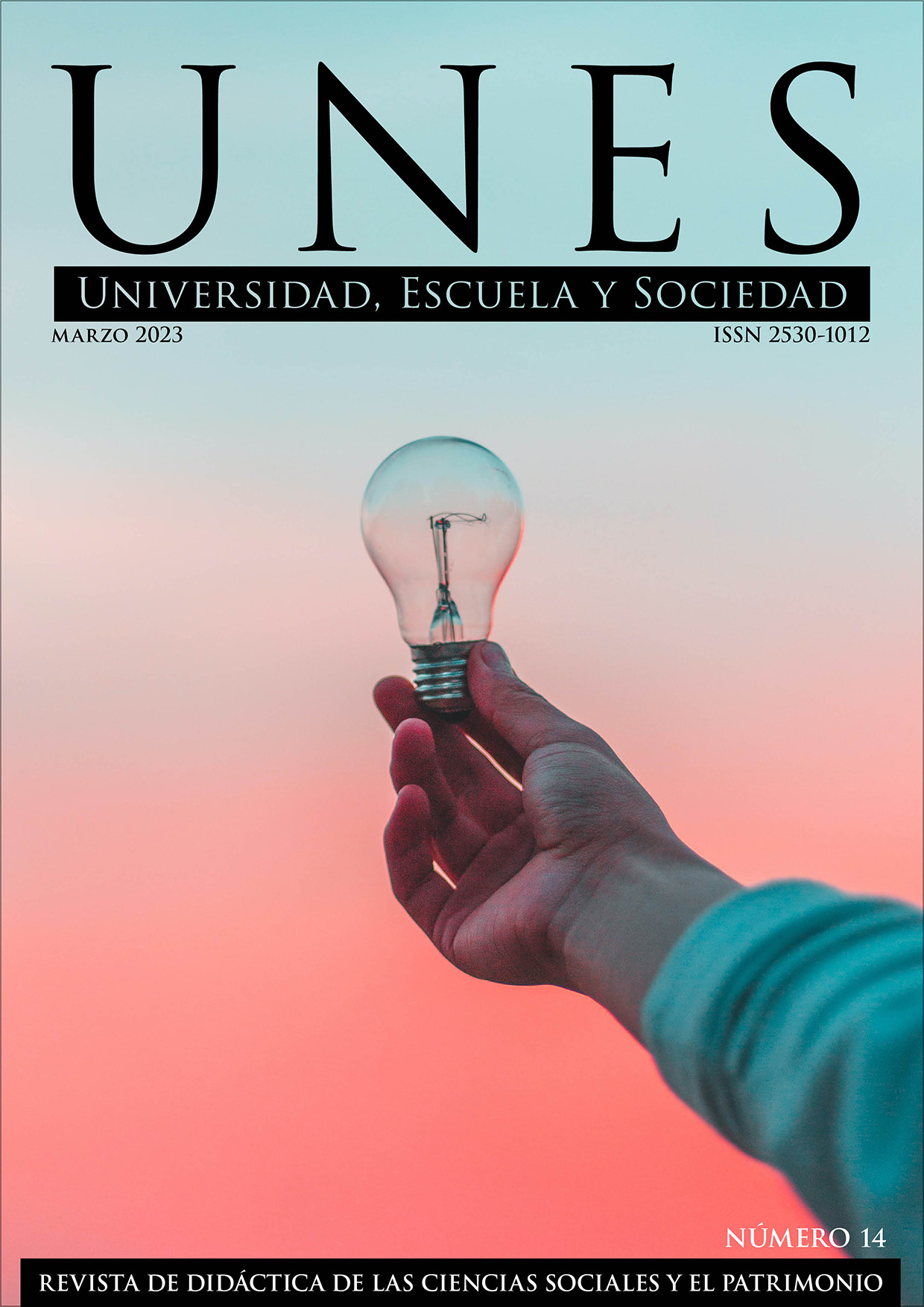Student Academies of History in Paraguay
DOI:
https://doi.org/10.30827/unes.i14.27184Keywords:
Didactics of the Social Sciences, History, Student Academies of History, ParaguayAbstract
This article has been prepared from the communication made within the framework of the VII International Conference on Didactics of Social Sciences. Teaching Social Sciences: citizenship and heritage. Contains a presentation of the experience of the Student Academies of History in Paraguay (AEH). Its pedagogical foundations and the main lines of its practice are exposed. Likewise, his social trajectory is described with the impulse of the Paraguayan Academy of History. For its elaboration, a descriptive methodology was used with techniques that combined documentary and bibliographic analysis, as well as interviews with key figures.
Downloads
References
Academia Paraguaya de la Historia. Archivos.
Aguilera-Torrado, A., & Payares-Ortiz, A. (2021). El club juvenil como estrategia para la prevención del consumo de drogas y la delincuencia juvenil. Caso Barrancabermeja. Revista Criminalidad, 63(2), 155-174. https://doi.org/10.47741/17943108.322
Arce, M. E. (2004). Organización y funcionamiento de los círculos de aprendizaje. CONEC.
Cardozo, I (2002). La pedagogía de la escuela activa. Tomo II. La escuela activa aplicada. Fundación En Alianza.
Carretero, M., & Voss, J. (comps.) (2004). Aprender y pensar la historia. Amorrortu editores.
CONEC (2001). Líneas fundamentales de la Reforma de la Educación Media.
Díaz Bordenave, J. (2011). La educación popular en tiempos de democracia participativa. Educación y cambio. Revista del Consejo Nacional de Educación y Cultura, 4:10-14.
Entrevistas a actores clave
Felizzola, Y (2021). El Tiempo Libre como Espacio de Aprendizaje, Crecimiento Personal y Proyección Profesional. Especialización en Docencia Universitaria Unidad Académica de Ciencias de la Educación – UACE Universidad Piloto de Colombia Bogotá D.C. Trabajo de grado. .[fecha de Consulta 30 de junio de 2022]. Disponible en: http://repository.unipiloto.edu.co/bitstream/handle/20.500.12277/11343/Trabajo%20de%20Grado.pdf?sequence=1&isAllowed=y
Freire, P. (1972). Pedagogía del oprimido. Siglo XXI Freire, P (1996) Política y educación. Siglo XXI
Freire, P. (2002). Pedagogía de la Autonomía. Siglo XXI Freire, P. (1993) Cartas a quien pretende enseñar. Siglo XXI.
Guerrero, M. E. (2000). La escuela como espacio de vida juvenil. Dimensiones de un espacio de formación, participación y expresión de los jóvenes. Revista Mexicana de Investigación Educativa, 5(10), .[fecha de Consulta 1 de julio de 2022]. ISSN: 1405- 6666. Disponible en: https://www.redalyc.org/articulo.oa?id=14001003
MEC (2014). Actualización curricular del bachillerato científico de la educación media plan común. Área Ciencias Sociales y sus tecnologías. MEC
Velázquez, D. (2018). Relaciones entre autoritarismo y educación en el Paraguay 1869- 2012, Cuarto volumen 1989-2012. La educación en el Paraguay después de Stroessner. Serpaj - Diakonía
Downloads
Published
How to Cite
Issue
Section
License
Copyright (c) 2023 Julio Espinola

This work is licensed under a Creative Commons Attribution-NonCommercial-ShareAlike 4.0 International License.
Authors being published in this journal agree to the following terms:
The authors retain their copyrights but guarantee the journal's right to be the first publisher of the work, licensed under a Creative Commons Attribution-NonCommercial-ShareAlike 4.0 International license, which allows others to share the work, provided that they acknowledge its authorship and initial publication in this journal.
Authors may separately subscribe additional agreements for the non-exclusive distribution of the work published in the journal (for example, including it in an institutional repository or publishing it in a book), with recognition of its initial publication in this journal.
Authors are allowed and encouraged to disseminate their work electronically (for example, in institutional repositories or on their own websites) before and during the submission process, as this may result in productive exchanges, as well as more and earlier citations of the works to be published (See The Effect of Open Access) (in English).






 ISSN-e: 2530-1012
ISSN-e: 2530-1012









